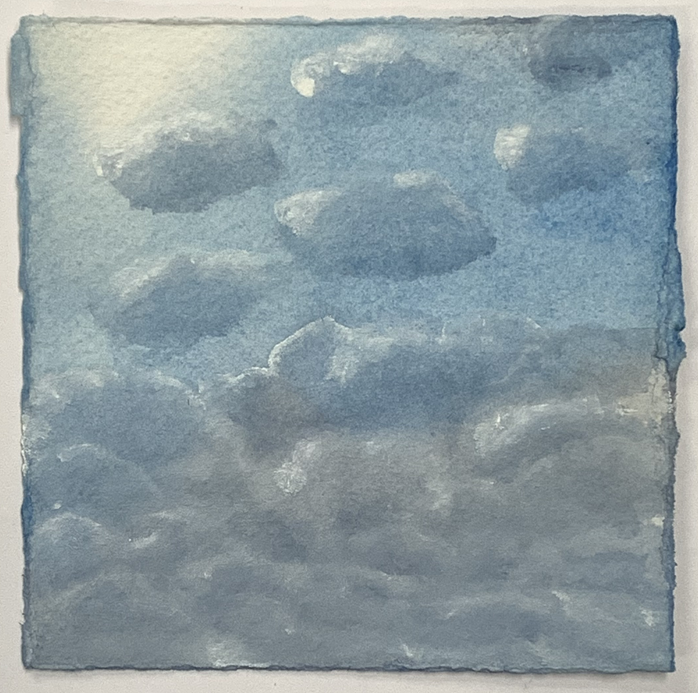 Jean Wilkey
Jean Wilkey
The Patio
by NOURIN OMIDI
I’m standing right at the center of the stage, staring at the clapping audience. I look into their faces; they’re wiping tears from their eyes. My mother is among them. Her eyes shine with pride, not because of my skillful performance in the play, but because of what she knows I have learned playing the role of Mona in my declaration ceremony.
Like other Bahá’í youth, to officially join the community, I declared my faith when I turned fifteen. Many families mark the occasion with a celebration, and that’s what my family and the families of my friends are doing right now. I’m sure everybody has been moved by the ceremony, but as for how I feel right now, because I am a Bahá’í living in Iran, I am aware that I have set out on a path of beauty and of danger. The beauty is in the spiritual growth ahead and the danger lies in the cruel people in the government — a government who does all it can to keep its non-Bahá’í citizens from discovering the truth — who might subject me to persecution in the future.
From my research for my role, I know that Mona’s mother was the one who had to identify the dead bodies of the ten women executed in Shiraz, before they could be taken to a burial ground. She had to pull away the white sheets that covered the body of each of the women. As I watch my mother applaud my performance, I can’t help but wonder: how did Mona’s mother feel when she looked at her daughter’s face? When she pulled back the white sheet and looked on her daughter’s lifeless body, what did she feel? Grief? Pride? Or both?
A hand touches my shoulder, and I come back to the current moment. My Dars-e-Akhlagh tutor, the one who has directed our play, is touching my shoulder to show her love and appreciation for my efforts in putting on this play about the arrest and execution of Mona Mahmoudnejad, a seventeen-year-old Bahá’í from Shiraz. Mona was executed along with nine other Bahá’í women who, like her, refused to recant their faith and embrace Islam. Each was forced to watch the executions of the ones who went before them. The executioners decided that Mona should go last. They thought that watching the other nine women hang might scare her into apostasy.
The performance is over now. Our tutor hands each of us a rose, and, as she does, I think of the final scene in the play, when the officers circle around Mona and try to persuade her to deny her faith and declare herself a Muslim. In the play, the officer shouts: “You’re only seventeen! Be wise, we’ll let you go home.” But seventeen-year-old Mona cannot and does not do it. She holds a flame inside her heart and those words do not touch its fire. Her faith is unbreakable. She goes bravely ahead and makes her sacrifice.
The flash of a camera brings me back to the present moment. “Smile everyone,” my friend’s dad says as he snaps photos. I have no mirror to look at myself, but I know I have a new kind of smile on my face, a smile that signals some kind of spiritual growth, growth which may not be obvious to others, but is to me. My thoughts turn back to Mona. Years ago, Mona’s mother, Farkhodeh Anvari, told my mother this: “Mona asked me not to baby her in those five months I was in prison with her. She didn’t want the other prisoners to feel alone, sad that they were not with their mothers.” And when she was in prison, Mrs. Anvari said, Mona had said this to her:
Mom, to me, this is not prison, it’s a patio. Please do me a favor: when the day comes, and all ten of us are gone, do not come for my corpse first. Please go and see all of my other friends and pray for their souls, and then come to my body — last.
The declaration ceremony is over, and my family and I are on our way home. My role in the play has ended, but not my role in this world. Can I follow the footsteps of Mona, Zarin, Akhtar, Shirin, Roya, Nosrat, Ezzat, Mahshid, Simin, and Tahirih? I am only fifteen. What can I do? Then I remember that Mona was only two years older than me; her brave soul, her unbreakable faith, and her love for humanity were her super powers.
In the essay that spurred her arrest, Mona wrote about freedom as a gift from God, a gift that cannot be taken away by anyone. Years ago, Mona stood up for her freedom, and now, more than forty years later, there are many people in Iran who are willing to sacrifice themselves in their search for freedom.
At the age of fifteen, I decided to take the ten women of Shiraz as my role models. Now, seven years since my declaration ceremony, in the wake of the countrywide protest movement ignited by the death of Mahsa Amini, I am heartened to see that Mona’s quest for freedom continues in Iran, in the lives of Mahsa, Nika, Sarina, Mohammad Mahdi, Minu, and Mohammadreza Their stories are no different than Mona’s. Their story, our story, is one.

